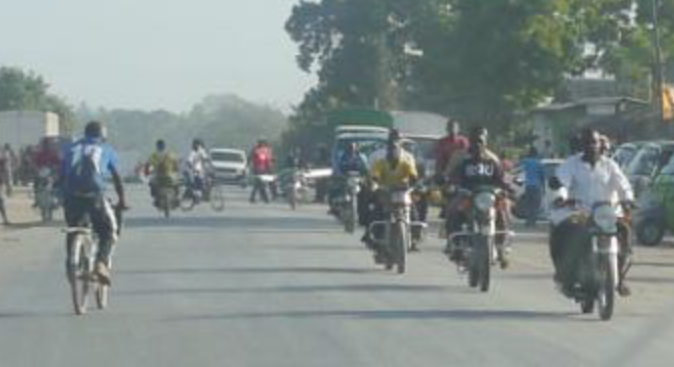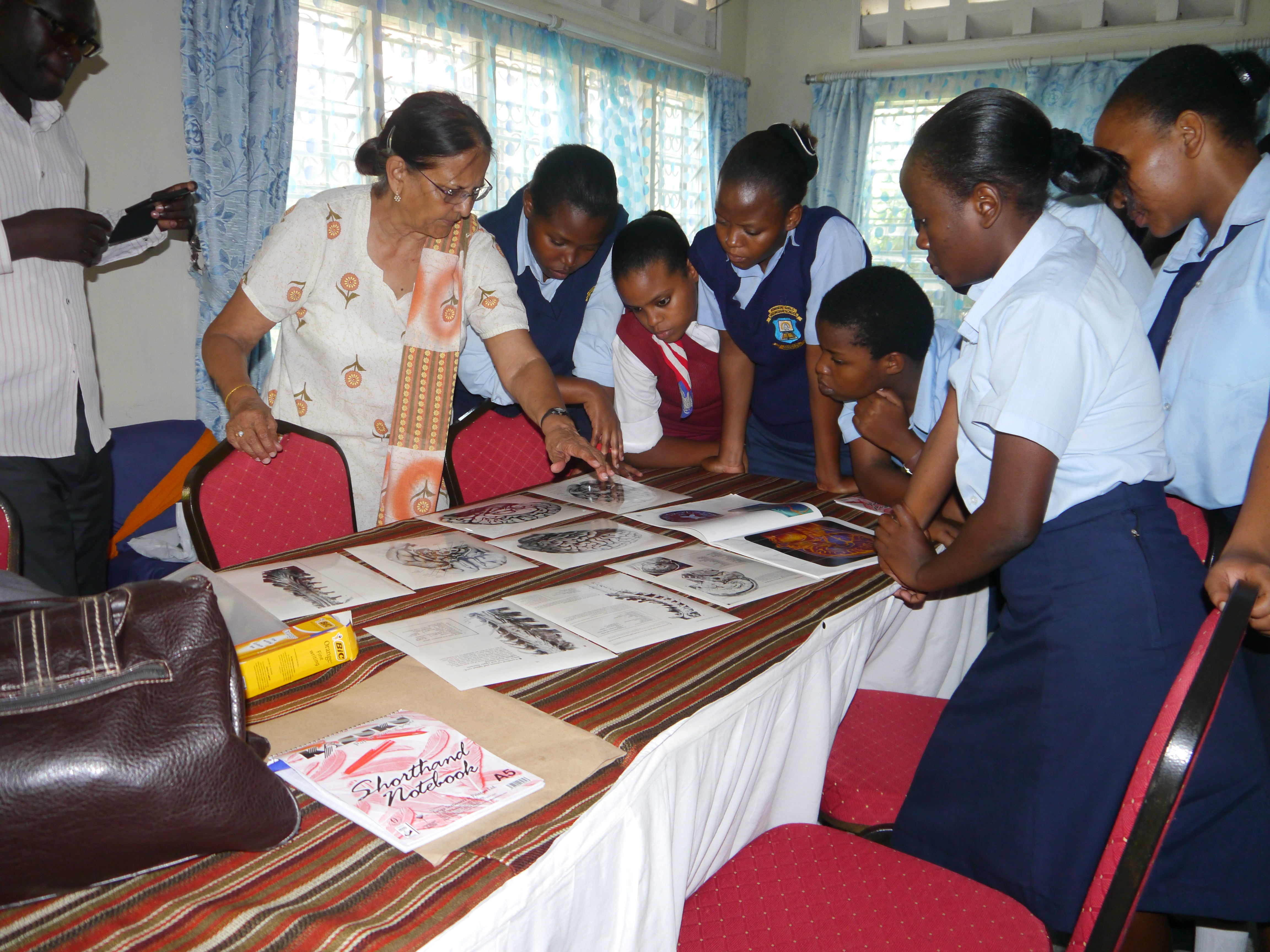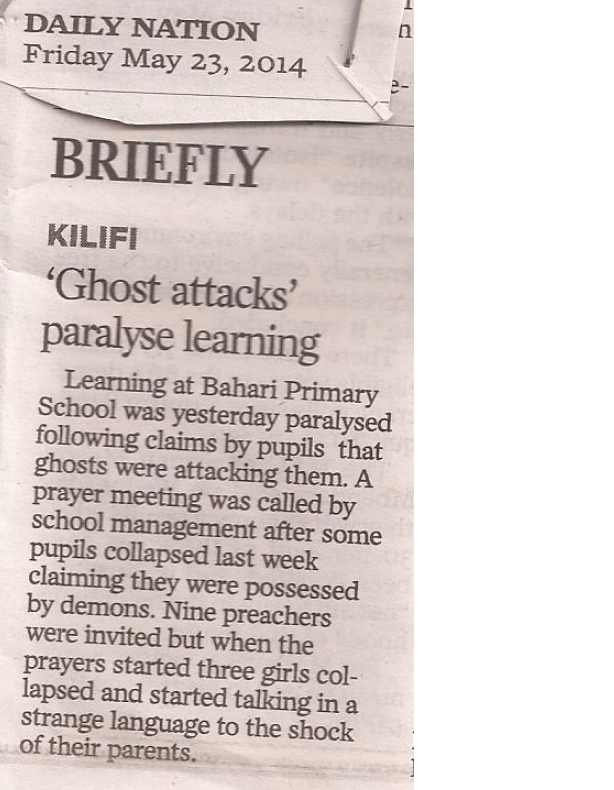
Death in the boot of our car
Saturday morning, 25th of July 2009, my husband and I needed to get to Mombasa and buy some house items that had been on our ‘to-do’ list for a long time. The children would stay home with ‘Aunty Ruth’ – who tended to spoil them quite a bit – so they happily waved us good bye.
A little past Shanzu Teacher’s College there appeared to be a big traffic jam. People were running towards a white lorry that had stopped in the middle of the road. Cars were driving slowly past the lorry as people begun to crowd about it. It appeared that an accident had occurred and by the time our car got to the scene, we expected the injured had been taken to hospital. So we were surprised to see a group of young men struggling to carry two men between them. They were holding the men by the arms and legs and when we drew near, they started banging the side of our car.
‘Wasaidie mama, please tusaidie, ‘ the young men pleaded, asking us to help the injured men.
My husband stopped, opened the boot of the car and lay the back chairs flat. The men that had been struggling to hold the two men dumped them roughly unto the boot – relieving themselves of a weight that they were obviously finding very difficult to carry. The two men were shoved about in the boot so that they could fit inside.
‘I will come with you,’ one of the men wearing the dark red conductor’s uniform said.
‘Drive on,’ he said, although the boot was still wide open.
‘Chukua number plate ya lorry,’ a young man outside the car kept saying as we started to drive. He wanted us to make sure we had the number plate of the lorry that had knocked the men.
I found a paper and biro and another young man run ahead and jotted the number plate of the lorry. The traffic jam was awful and although we were still driving, the young man managed to get the paper to us.
‘Chukua number plate, chukua number plate!’ he said.
I grabbed the piece of paper and put it in the pockets of my shorts then I turned to look at our passengers. One of them was still and the other started to moan and try to sit up.
‘Tulia brother,’ the conductor who was now seated beside him said, forcing him to lie down.
The young man kept trying to sit up and the conductor kept pulling him down.
‘Tunaenda hospitali baba, tulia tulia tuko na wewe,’ I said trying to comfort him.
My voice calmed him down, perhaps hearing a woman’s voice was reassuring. I held on to his hand which was next to his face. His legs were sprawled in an awkward position, he appeared to have broken both legs.
I tried to piece the story from Patrick, the conductor who had volunteered to sit in the back with the two injured men.
‘This one was driving the motorbike,’ he said pointing to the man who was lying still in the boot ‘this other one was the passenger and between then was a small metal box.
‘I saw them drive past us before we heard the screech of the lorry, they were going too fast and over-taking at high speed. They lost control and went straight into a large white lorry. The driver of the lorry tried to stop when he saw what was happening but it was too late. The box between the men was full of heavy metal pieces, I understand one of them works in a small garage,’ Patrick said.
So now we knew. We were carrying side by side, a dead man and a severely injured one.
The traffic headed for the Nyali bridge ahead seemed to be almost standing still. We could hear the man who was alive straining to breath and we decided to go to a nearby private hospital that we knew had a reputation for treating people well. By then, Patrick had found a wallet from the dead man’s trousers and inside was a note from a police station. It appeared he was to go for a mention of a case within the week. So we could assume from that note that the dead man was Gambo but we had no clue who this man who was groaning beside him was called.
On arrival at the private hospital not far from the bridge, I dashed to the reception and asked them to get our accident victim quick. Staff members in their white lab coats came to the car and then quickly went back into the hospital to get gloves and a stretcher. When they came back, they stood staring into the boot of the car, watching the victims, not knowing what to do or not wanting to do anything. Patrick pushed the moaning man slowly out of the boot and so the white coated men held on to his legs. At one point, the injured man was being help up by one leg, the other leg and hip dangling. He let out a moan and they quickly tried to hoist him unto the stretcher. The stretcher was a bit high for them and they could hardly place him gently up unto it – the patient let out another groan as he landed roughly on the stretcher. He was taken into the emergency room and immediately started to receive first aid.
They did not even touch the dead man in the car. So my husband drove to the corner of the car park and left the dead man in the boot of the car.
I had to fill forms at the reception desk.
‘What is his name?’
‘I don’t know,’
The lady at the reception looked at me suspiciously.
‘We just collected him at the scene of the accident. I don’t know his name,’
‘Who will pay the charges?’
‘We shall pay some, just treat him’
‘It will be expensive, are you sure?’
‘How expensive?’ I asked.
‘Let’s call the in-charge?’
The in-charge arrived, a nice cheerful man.
‘You are saying you will pay. That guy is badly broken, he will need metal rods in his legs for those fractures. Today you are saying you will pay and then tomorrow you will say you were just a good Samaritan. I don’t want to be left with a bill. Are you sure?’
‘Kwani how much will it be?’ I ask.
‘We are talking a hundred thousand or so,’ he said, ‘the man will go to the theatre you know.’
My husband was back from parking the car – we look at each other. Both of us were thinking ‘We don’t know this man, where are we going to get this kind of money from. What the hell were we thinking taking this on?’
‘Let’s wait for the surgeon then. If he says, he can move to the Coast general hospital, then we move him,’ I finally said.
The surgeon arrived as we spoke. The young man was wheeled past on a stretcher, they were going to do some x-rays. But he was already receiving blood and fluids. We were pleased that something was happening. I was called to the X-ray office and asked if I was sure that I was going to handle the bill.
‘Are you the one who hit him?’ they ask me.
‘Oh no,’
‘These are good Samaritans!’ Patrick kept saying and telling the story over again to anyone who would listen. It was great to have someone who would vouch for us. That did not however stop everyone from assuming that since we brought the man to the hospital, we were responsible for paying his bill.
As he was examined earlier, a wallet was found in his pocket with nothing but a list of phone numbers. The receptionist at the desk started to call each number one at a time. One of the persons called was at the hospital within 10 minutes but it turned out that he did not know the guy at the hospital but he knew most of the people on the list. He located ‘baba’ on the list and decided to call him. The man going by the name ‘baba’ happened to think that the man in the hospital was his son and he said he was on his way. The man, our injured man, was called Emanuel.
By now, my husband and I had emptied our pockets. Between us was eight thousand shillings which we paid as a deposit. I explained to the cashier that we are not refusing to pay the bill.
‘We have a body in the boot of the car, we can’t exactly drive to the ATM, can we?’ I asked.
Soon, the surgeon was through with his initial examination of Emanuel. He had air in his chest, he had punctured his lung and there were some internal injuries. His condition was critical.
‘Can he be moved once he is settled?’ I asked, ‘How much will it cost?’
‘You either decide to help him or you move him and he dies. That is your option’, he said.
There did not appear to be an option so the surgeon prepared to go to theatre. As we were talking, a policeman arrived, he wanted to help with taking the dead body to the mortuary. My husband stayed at the hospital to make sure that the man who needed surgery would be taken to the theatre. We feared that if we left, the hospital might think we were not committed to paying and not treat him.
I had the unpleasant duty of driving the body in the boot to the Coast Provincial General Hospital. The policeman sat at the front with me and Patrick was at the back with the body. The policeman had been briefed of the accident at Shanzu so I had no difficult questions to answer.
‘You are the only woman I have met with a ‘heart so hard’ you can drive with a body in the boot,’ he said to me
‘But what can I do?’ I asked him.
At the casualty, he left me with Patrick and dashed into the hospital. We got out and opened the boot of the car. Before then, the only dead body I had ever seen was that of my father who died in 1997. I saw him because I had to, I needed to. I never view bodies at funerals and never take a look at an accident scene. But I had carried this man in my car for a few hours now and I felt I needed to know him.
The first thing I noticed was the silver ring on Gambo’s wedding finger. My heart sunk, ‘he must have children, very young children,’ was all I could think. Gambo wore white socks, no shoes, those were likely lost at the scene of the accident. The only visible injury, the only bleeding place was skin that was torn off his hand. His injuries must have been all internal. He was wearing blue trousers and a white shirt with stripes. He had a thick blue jacket. His dark face still haunts me. He could not have been more than 25 years old, clean shaven and his eyes were half open. His lips looked dry, thirsty. His clothes were clean. I felt attached to poor Gambo.
When the police officer came back, a young man walked behind him, a stethoscope swinging on his neck. I assumed he was a fresh graduate on his internship. He checked for a pulse from the jugular on Gambo’s neck. He listened for a while and examined his body a little before writing something on a piece of paper. I assumed he was pronouncing Gambo dead. The police officer went away with the doctor and returned with a bandage with a name on it and plastered it on Gambo’s forehead.
‘Twende mortuary,’ the policeman said when he was done.
Again we got into the car, policeman, Patrick and Gambo’s body. At the mortuary, the gate was locked. The policeman knocked on it but no one responded. Both Patrick and the policeman went out to search for someone to open the gate for us. I was now alone in the car with Gambo’s body at the back. I had seen scenes like this in movies before and they always felt fabricated to the extreme.
Finally the gate opened and I drove up the little incline. Two mortuary attendants came to collect the body. They cheerfully greeted the policeman and asked if the body was labelled. One grabbed at the legs and the other at the shirt and they flung Gambo’s body unto a tray. It was polished clean, like a very large cake tray. They then hoisted the tray unto a stretcher and Gambo was taken into the depths of the mortuary.
‘Do you want us to wash the inside of your car?’ they asked.
A little discussion arose between the policeman, Patrick and the mortuary attendants before it was agreed that I would miss the wash. The police man and Patrick got into the car and we drove back to the hospital. At the hospital, we meet the father of the boys. I offered my condolences and we took the mobile number from the uncle. Some of the women were crying, mourning Gambo. I wondered whether it was the wife. I was told that he had a wife and two pre-school children.
As my husband and I drove away from the hospital, we consoled ourselves with the thought that at least Emmanuel was in theatre and all would be well. I had left my contacts at the hospital and we were worried that the hospital would continue to charge us for the treatment of Emanuel.
We went to Kobil petrol station near the Nyali Nakumat to get the car washed. The attendant was happy to wash the car until we opened the boot and he saw the blood stains. He looked at us with naked suspicion.
‘This one I will not wash,’ he said.
‘We will pay’
‘Even if you paid me what – I will not wash this one,’ he said and turned and walked away.
We had not stopped to consider what someone would think of blood in the boot of a car. I realised now why the people at the mortuary asked us whether we wanted them to clean the car. We did not want to risk going to another petrol station in case we found even more suspicious people. We had not eaten all day so we thought to at least get a drink.
Just as we were seated, we got a call from the hospital. Emmanuel had died while undergoing surgery at the theatre. We were downcast. Emmanuel had made us feel that the trip to Mombasa had been worthwhile and we felt deflated. We drove back to the hospital. The family was outside the hospital. The women were hurdled together and the man together. The father walked up to us.
‘Ametuacha (he has left us),’ he said.
‘Pole mzee, jameni, pole,’ was all we could say.
He was in such shock that his eyes were dry.
‘My third born and fourth born’ he said.
We went to the reception and asked about the bill – we felt it was all we could do for the family. They seemed so distraught. Someone asked if we wanted to see the body. We had seen enough and did not want to go there. In the end we shared the cost fifty-fifty with the family now. The father was grateful and wished us well. It felt awkward leaving them. All we could say was sorry. We could pay part of the bill all right but we could never bring back the children, father, brother, uncle, husband that they had lost.
The drive back was chilly. The adrenaline was out of our system and we could now face what had happened. We had been carrying a dead and dying man in the car most of the day.
I thought about the first scene in the whole event. The way Emanuel and Gambo were handled at the scene of the accident. The fact that between them there was no phone or a single shilling meant that the first people on the scene had emptied their wallets and pockets of any valuable thing. What kind of society is this that steals from dying people – where is our dignity? In today’s DN2 cover story of the Daily Nation, Dominic Omondi writes about how Kenyans are failing to watch out for others in need – http://www.nation.co.ke/lifestyle/DN2/No-longer-our-brother-keeper
This is a story for another time.
The way the brothers were carried at the scene of the accident may have added to their injuries. If a person with a broken rib is carried by the shoulders and dropped like a sack of potatoes at the back of a car, would that not cause more injuries? The young men trying to put the brothers in the car were doing their best – in Kenya what would be the point in calling an ambulance to an accident scene? They had to bang on every passing car and beg for someone to take those men to hospital.
Although initially I thought all the people who passed the young men and did nothing were callous – our experience showed that things can get hairy should you carry someone from the scene of an accident. Those ahead of us knew something we did not. They knew people would assume that they had caused the accident that injured these men. Were it not for Patrick, the conductor who volunteered to come with us to the hospital, everyone would have assumed we had knocked these men down. Patrick had saved us and the policeman had been dutiful enough to come to the hospital and stand by us.
Those ahead of us may have known that they would be expected to foot the hospital bill for a person they barely knew. The hospital was unwilling to treat Emanuel without us paying some money upfront. Yet the attitude in this particular hospital was way better than that of many I have heard about. They at least gave him some First Aid before we had paid anything. I will also never forget the surgeon, a Dr Mwaura, who did not charge us for his service, which helped to keep the bill low.
I also could not believe how Emanuel was carried from the boot of our car unto the stretcher at the hospital. He was dangling from a stretcher that could not be adjusted. Again a broken rib would have easily injured his heart or lung at that point. Why do our hospitals have stretchers at the casualty that cannot be height-adjusted?
Traffic accidents are horrible things but some deaths can be prevented. Strangers had been handling the brothers at the scene of the accident for at least 15 minutes before we were able to put him in our car. Car after car passed these young men, everyone unwilling to take the brothers to hospital for fear that they would later be accused of having knocked them and also the fact that they would have been required to pay hospital charges.
We need systems in place that enable private hospitals to get refunds from the government for treating emergencies to avoid deaths from a person arriving at the hospital with no money at hand. This would enable any emergency to be treated at any hospital without people constantly being asked whether they can pay. I still can’t get over the fact that money, paying for Emmanuel’s treatment- was all that bothered everyone at the hospital.
A dear friend ages ago lost his wife after a car accident. His wife of a year was 7 months pregnant – the accident occurred near a private hospital so they rushed there with his unconscious wife. The poor man had to look for an ATM to withdraw some cash before the hospital attended to his wife. She later died from her injuries. Only heaven knows whether her life would have been saved had the hospital attended to her immediately she arrived instead of asking for money.
After this incident,most doctors I spoke to said public hospitals are actually better at handling accident victims than private ones because they have practice of doing it. However, the jam at Nyali bridge that day was barely moving and we worried that waiting to ferry Emanuel across would have meant that he would die in the car. If a private hospital is within minutes of a patient, why do you have to drive across town to a public hospital for fear of charges yet you have someone dying in your arms?
I can’t over-emphasize the need for a system that allows private hospitals to treat emergencies and get re-funds from the government. This is a debate that needs to be pushed harder – one of the way to minimize deaths and suffering from road traffic accidents.
Comments
-
Barbara Graham
Tabs, this is an incredibly sad story, on so many levels. Thank you for sharing it. I hope a campaign for private hospitals to treat emergencies will start and will be successful.
-
Bashraheil
Tabs very touching story, May God reward for what most of us would not have done!.. and you were lucky that the guy at the Petrol station who refused to wash the car did not call the Police and find yourselves being interrogated.
Agree our county government need to have a system of clearing Bills for Accidents victim and also I think they should be awareness to our society about joining insurance companies.
-
keniajin
A touching story here … Duthi’s/Bikes accidents are shocking but our hospitals should up their game
-
Sandy
What a sad story but thank heavens for your heart of gold . We now have a challenge.
-
Okal
God will reward you Mary.
Comments are closed.






Mwakughu Mary
Touching story